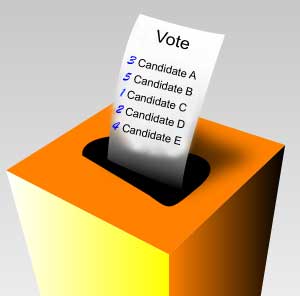In several earlier articles of this series we discussed Instant-Runoff Voting (IRV).
What's Wrong with Instant-Runoff Voting

IRV Ballot
(Image by (From Wikimedia) UkraineToday at English Wikipedia, Author: UkraineToday at English Wikipedia) Details Source DMCAInstant-Runoff Balanced Voting (IRBV)
A search on the internet will easily turn up additional discussions of IRV.
Under IRV, a voter is asked to list the candidates in order by preference. After voting ends, a series of counts and re-counts of the ballots determine the winner, with each count of the ballots eliminating a candidate. In the first count, only each voter's first-choice preference matters; in subsequent counts, only a voter's first choice among the remaining candidates matters. Notice that with each round of counting, a candidate's tally may increase but it can never decrease. Re-counts continue until either some candidate has more than 50% of the vote or only one candidate remains.
Various systems that have been proposed to correct the problems with plurality voting (the system we use), but one system seems to stand out as the most widely familiar and that is IRV. What accounts for its great appeal?
A likely answer is that IRV allows a voter to directly express his or her opinion of the relative merits of the various candidates. Voters want that ability and satisfying that desire is surely important. But also, the voter expects his expressed wishes to be reflected accurately in the election results. To the extent that this fails to happen, the expressiveness is merely an illusion. The failure of a voting system to meet this second test may not be initially obvious, but once the system is adopted it is likely that in time failures in this respect will be noticed.
To illustrate one potential danger with IRV, consider an election among eleven candidates. Suppose that ten of those candidates each get first-choice support from (roughly) 10% of the voters but the eleventh (with no first-choice support) enjoys being listed as the second choice of all of the voters. That consensus candidate best represents the will of the voters and should (ideally) win election; however, with IRV, that candidate would have no first-choice votes and so would be eliminated in the very first round of counting. The winner would instead be a candidate preferred by only 10% of the voters and who is the second choice of none. Following this electoral outcome, 90% of the voters would be left to wonder whether IRV is at all a satisfactory way to vote.
Is this a far-fetched scenario? An example is provided below in the discussion of IRBV that shows it to be quite plausible. But notice that there is nothing special about the number eleven; a similar example could be constructed with only three candidates and with two sharing all of the first-choice voter ratings equally.
Another concern about IRV might involve a voter whose first preference happened to be one of the two finalists to survive to the final round re-count. She might realize that none of her later preferences ever came into play and only her first-choice selection had ever mattered in any of the ten rounds of counting.
Should IRV be adopted, news reports would surely predict which candidates will be eliminated in early counting, giving our thoughtful voter more information and food for thought. Annoyed by having, in effect, to sit out the early counts the voter might well consider next time changing the order of preferences on her ballot to place some probable losers ahead of her true preferences on her ballot.
Furthering this line of thinking, she might decide to move into top positions on her ballot some candidates who seem least likely to win against her most-favored candidate. If the counting goes as she expects, then her preferred candidate (now in disguise as her fourth or even later preference) will still be in running at the final re-count, but that candidate could face easier competition. This somewhat risky strategy might even appeal to some Facebook groups as strategy worth chancing.
Strategic voting of this sort runs counter to how IRV proponents want voters to behave, but few voters will give weight to such considerations. Many voters will chose to vote whatever way they think will most influence election results rather than the one that would express their actual preferences. Other voters will obediently cast their ballots as they have been told to do and they will feel satisfied about their opportunity for self-expression.
A truly good voting system should not only allow voters to fully express their opinions but will also carry through and ensure that those opinions are accurately reflected through the counting of votes. Unless the voting system builds a very good match between expression and interpretation, voters will in time explore ways to bridge the miss-match.
(Note: You can view every article as one long page if you sign up as an Advocate Member, or higher).





